Michał Kwiatkowski wins the sprint to take the Amstel Gold Race, checking he’s got the better of Michael Matthews while Cauberg attacker Philippe Gilbert has already been tamed and beaten.
The early break was notable for two things. First the presence of Lotto-Jumbo’s Timo Roosen, because if the team had missed the move you sense they’d have been forced to bring it back in order to try again; second Mike Tepstra was there, the Roompot rider isn’t Niki’s twin but they’re look-a-likes. Despite no obvious threats the move was never allowed to get much time with BMC Racing and Movistar doing a lot of the tempo-setting, with BMC’s Marcus Burghardt notable for a lot of work. As ever on the small roads crashes took their toll, notably Lieuwe Westra. While if a rider punctured they could often get back to the bunch ok, it was moving back to the front of the peloton that was the hard part.
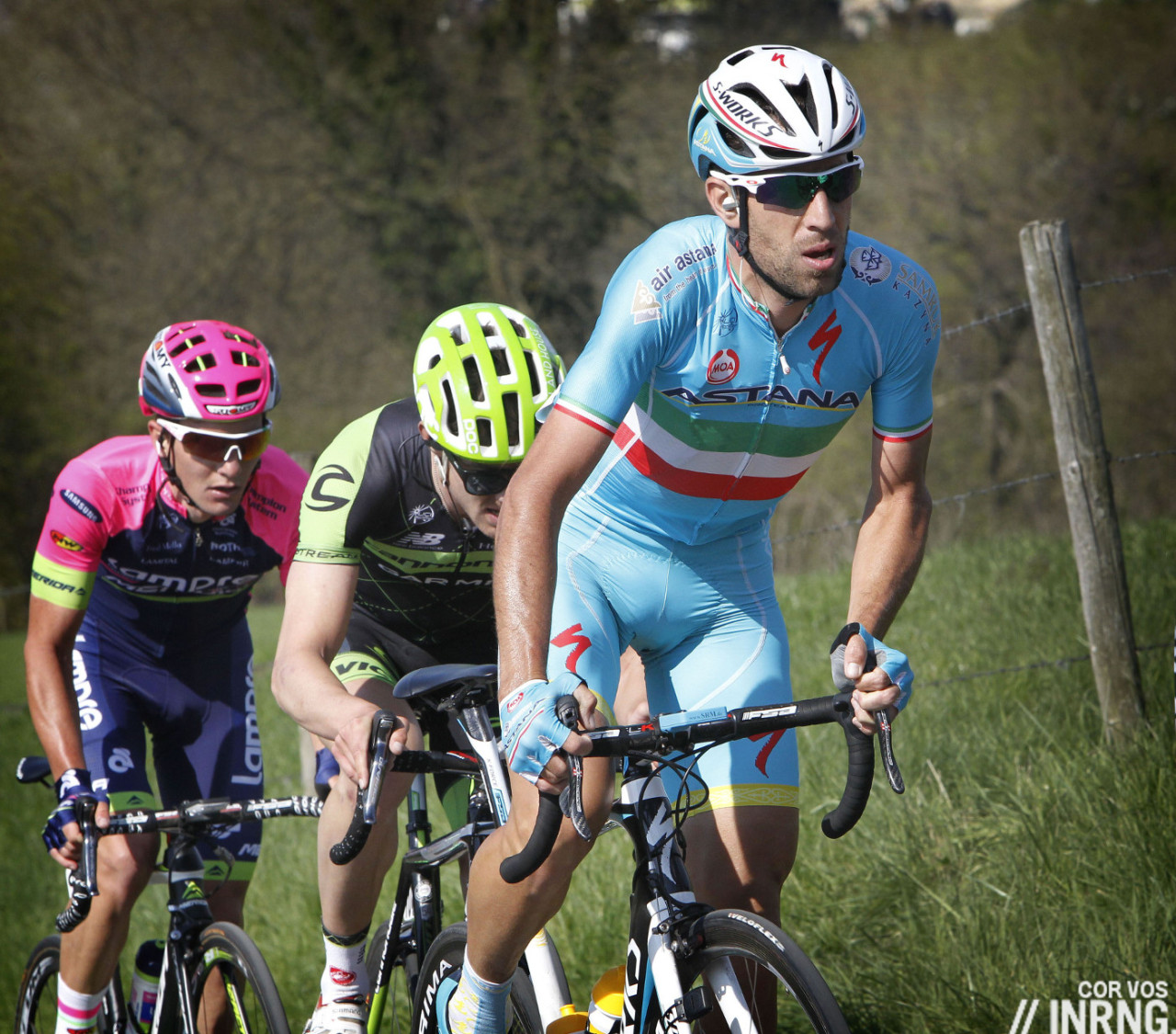
With the early fugitives’s advantage almost over IAM’s David Tanner took off with Simon Clarke (Orica-Greenedge) and the pair were joined by others, at first Alex Howes (Cannondale Garmin), Diego Rosa (Astana), Tony Martin (Etixx-Quick Step) and Damiano Caruso (BMC Racing) and Wilco Kelderman (Lotto-Jumbo) and none other than Vincenzo Nibali (Astana). Kelderman soon overcooked a corner, riding into a ploughed field and suffered the extra misfortune of it all being live on TV, the cameras dwelling on his chasse patate effort for domestic reasons.
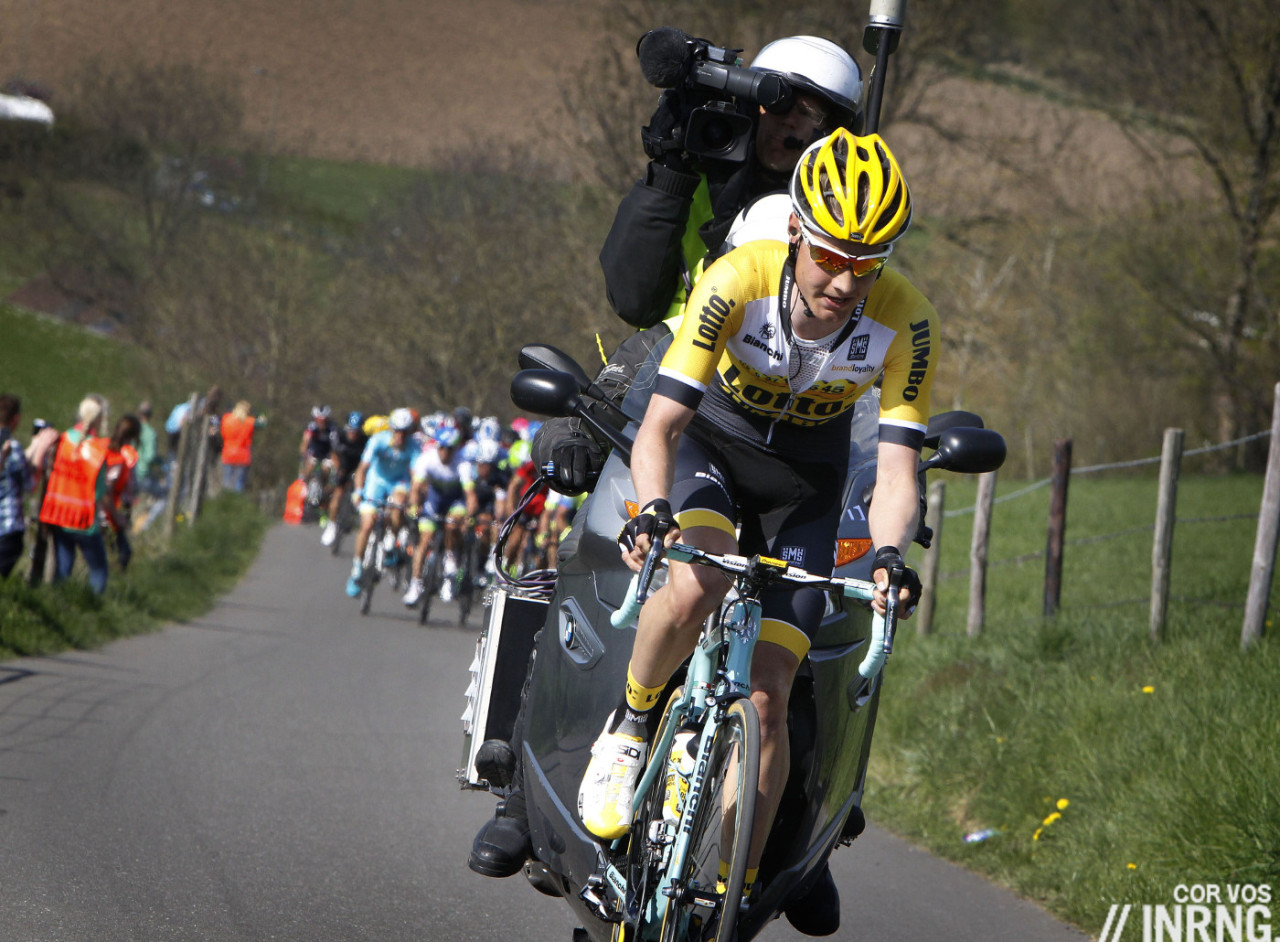
Then another crash and things got tactical because Diego Rosa and Damiano Caruso were out. It meant Nibali had no team mate to work for him. That said Rosa’s contribution wasn’t certain given Nibali complained about his selfish riding in the Strade Bianche. Crucially BMC Racing went from having a rider up the road to having to chase and the move’s 50 second advantage began to fall. This was vintage “one day Nibali”, the rider who enlivens a race with some big moves but goes too early to win. He duly attacked and took three others but as they crossed the finish line for the final loop their lead was slender. Simon Clarke took off, presumably not to win but to force other teams to chase and let his colleagues sit tight. Then the race was neutralised by the headwind, the wide roads meant nobody could get away and if Jacob Fuglsang tried, he was marked by Greg Van Avermaet.
The race dropped into Valkenberg. Gilbert’s imminent attack on the Cauberg wasn’t so much telegraphed in advance as engraved in a stone tablet, the Cauberg is to Gilbert as the Taaienberg is to Tom Boonen. BMC Racing deployed the same tactic as last year sending a rider up the road at the start of the climb. Last year it Samuel Sanchez, this time it was Ben Hermans. It forced others to chase and then Gilbert jumped, deploying that devastating acceleration. It was Michael Matthews who chased, the worst of moves and the best of moves.
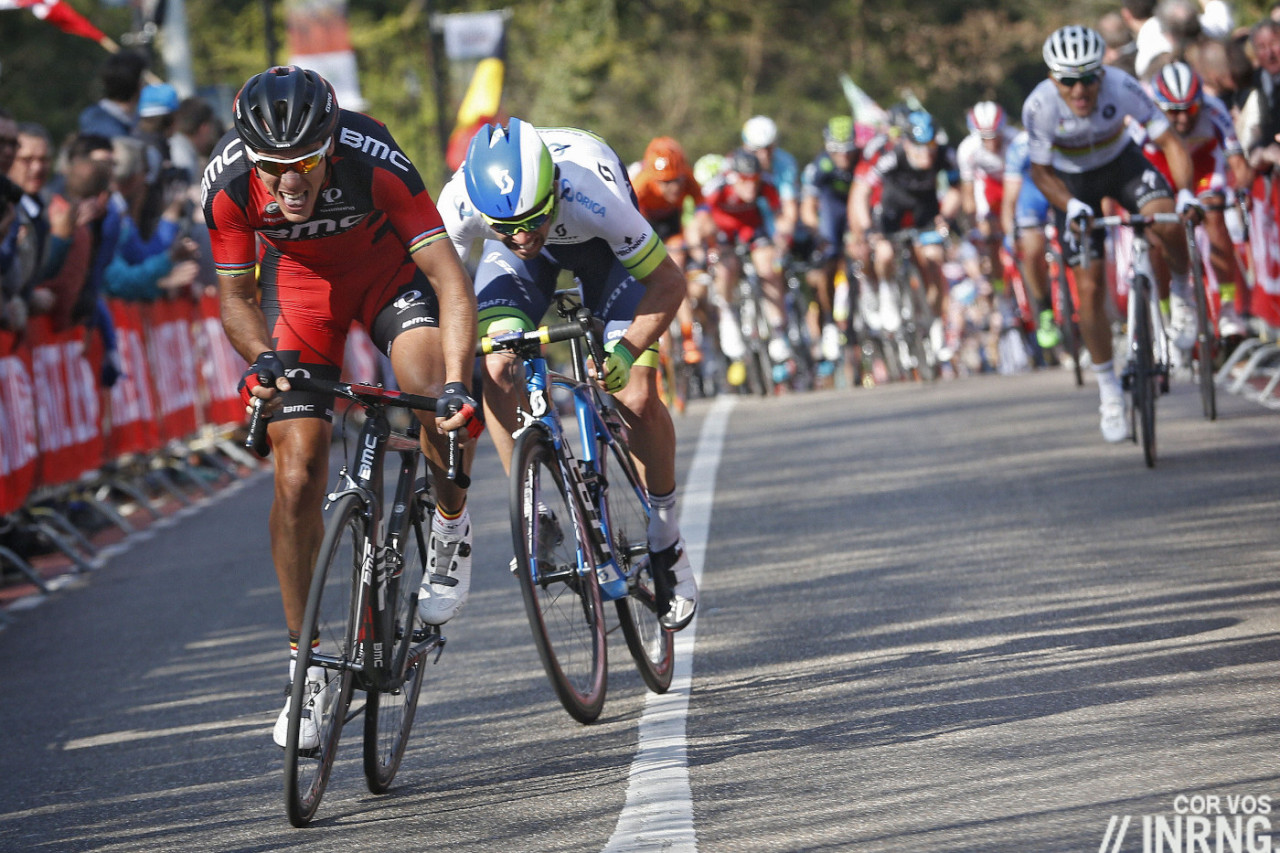
The best because Matthews must be in excellent shape to follow when nobody else could but the worst because it put him into oxygen debt and he’d pay a punitive price in the finish. Gilbert didn’t look as incisive as he was unable to pull out a big gap but this was also the story of Michał Kwiatkowski who set off in pursuit, passing others on the climb and then trying to ride across. He didn’t make it but his effort too others in his wake. Valverde jumped passed, others followed and Kwiatkowski had a breather. A few flourishes on the way to the line but they were pulled back. Kwiatkowski’s sprint looked relaxed, he overtook the others in the manner of a prudent motorist passing a truck: pulling out and the putting his foot down. But the lack of dynamism reflected fatigue, the 250km and the Cauberg effort earlier.
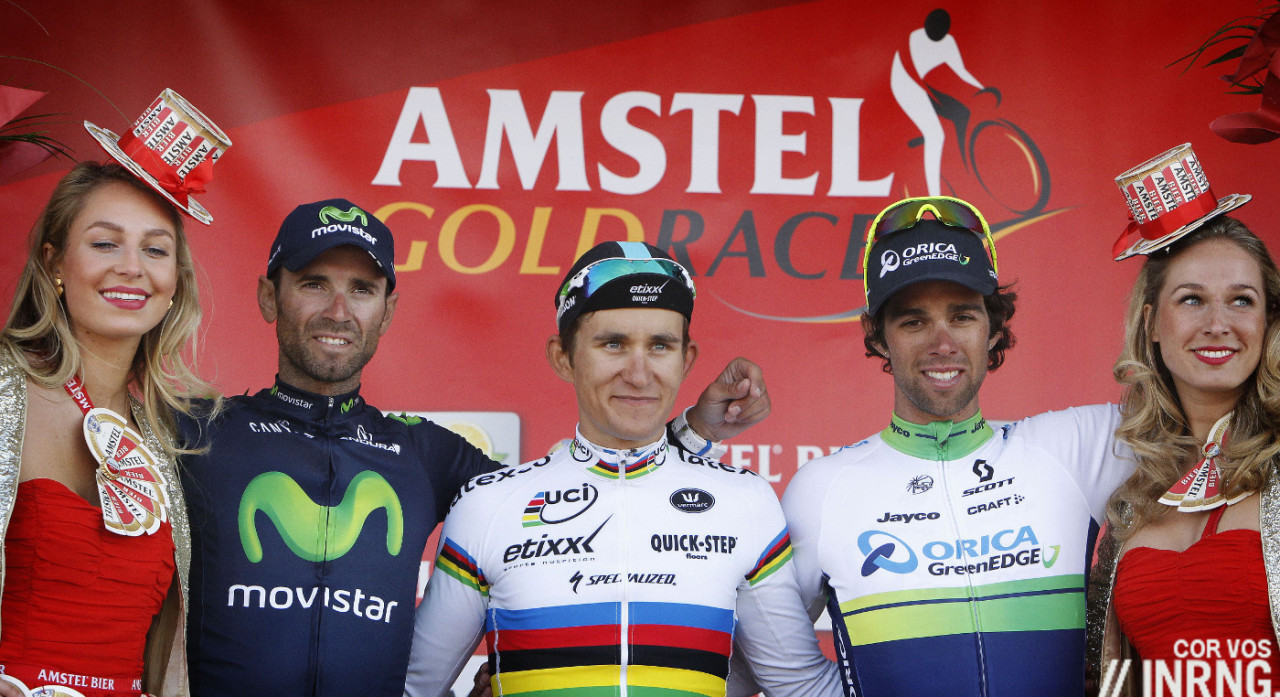
The Verdict
A worthy winner who not only proved the fastest in the sprint, he was one of the strongest on the Cauberg too. This wasn’t a sneaky win but a show of force. But in measuring the contribution to the effort, we’re left reviewing the final three kilometres of the race. Once the early breakaway was reeled in there there was action from Vincenzo Nibali but no move managed to take a minute, this was a nervous and compact race.
The race route could do with a change. After borrowing so many narrow and steep climbs the race heads to Valkenberg, climbs the Cauberg and then uses large, wide open roads in a final loop before returning to Cauberg. It makes the racing stale, if a rider wants to win with an attack they need, say, 20 seconds at the foot of the Cauberg to stave off the chase up the hill. But getting this on open roads, especially if the wind is against them, is near-impossible. Consequently there’s a tactical lock-down. The Cauberg and the run to the line are fine but what if they just scrapped the final circuit and its wide roads?
“He’s a good rider but he doesn’t win often”
Who said that earlier this week? None other than Patrick “le sévère” Lefevere. Normally prone to loyal defence of his riders – see his criticism of Ian Stannard after the Omloop Het Nieuwsblad – the Belgian boss factually correct but a touch harsh with his rider, still only 24. Kwiatkowski has had five second places this season and just one win, the Paris-Nice prologue. Kwiatkowski is now the fourth reigning world champion to win after Eddy Merckx, Jan Raas and Bernard Hinault, select company. Best of all for Lefevere, Etixx-Quick Step get that big spring classic win they’ve been looking for and seeing how strong Kwiatkowski was in the finish he must be a top pick for Wednesday’s Flèche Wallonne and the prime pick for next Sunday’s Liège-Bastogne-Liège.
As for the others… Valverde was predictably beaten in the sprint, he didn’t have the power here but will be a top choice for the hillier Ardennes. BMC rode a very good race and Gilbert was very fast up the Cauberg too, it’s just the others were on to him. After last Sunday’s hype Team Sky were almost invisible but Sergio Henao is ideal to win the Flèche Wallonne. Rui Costa, Tony Gallopin were the best of the rest with neo-pro Julian Alaphilippe in seventh. Meanwhile that’s probably it for Michael Matthews as the Ardennes are surely too hilly.
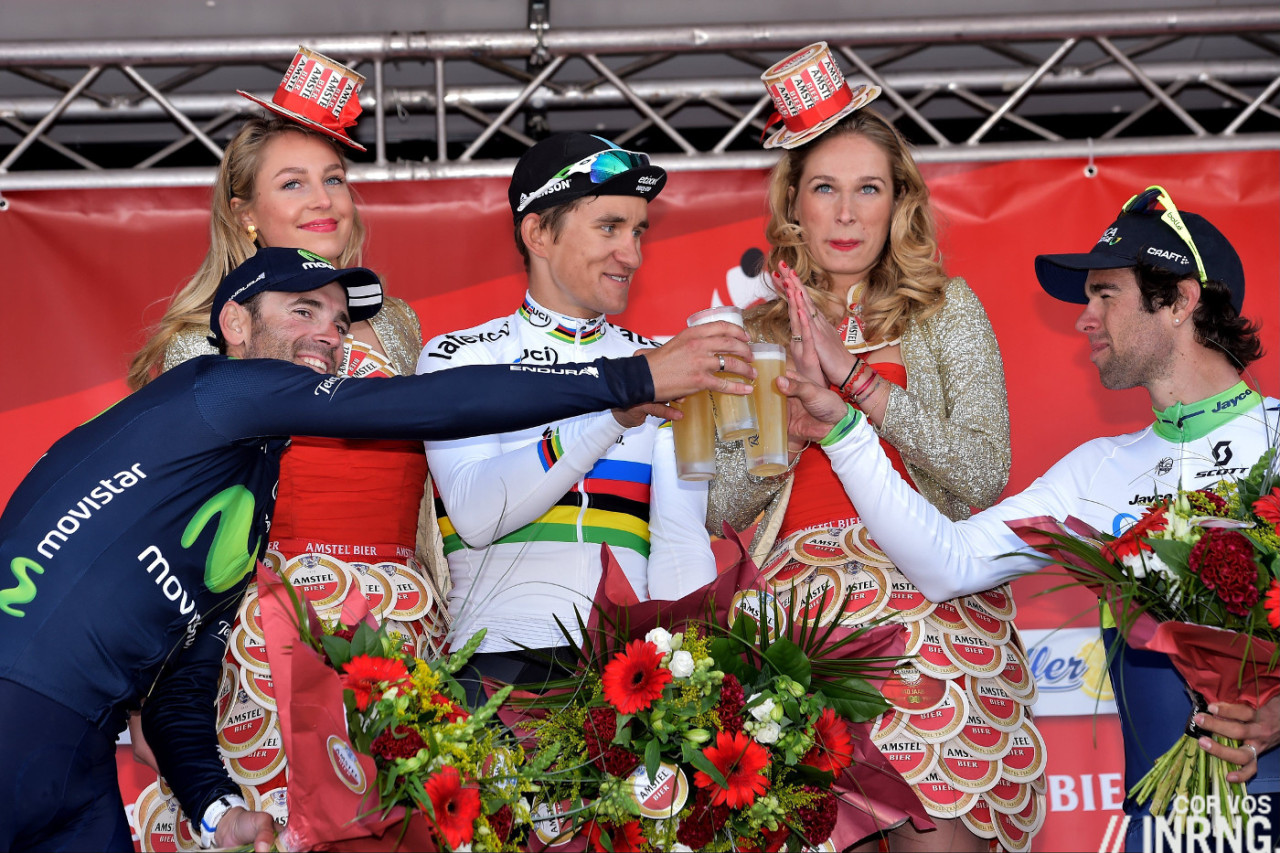

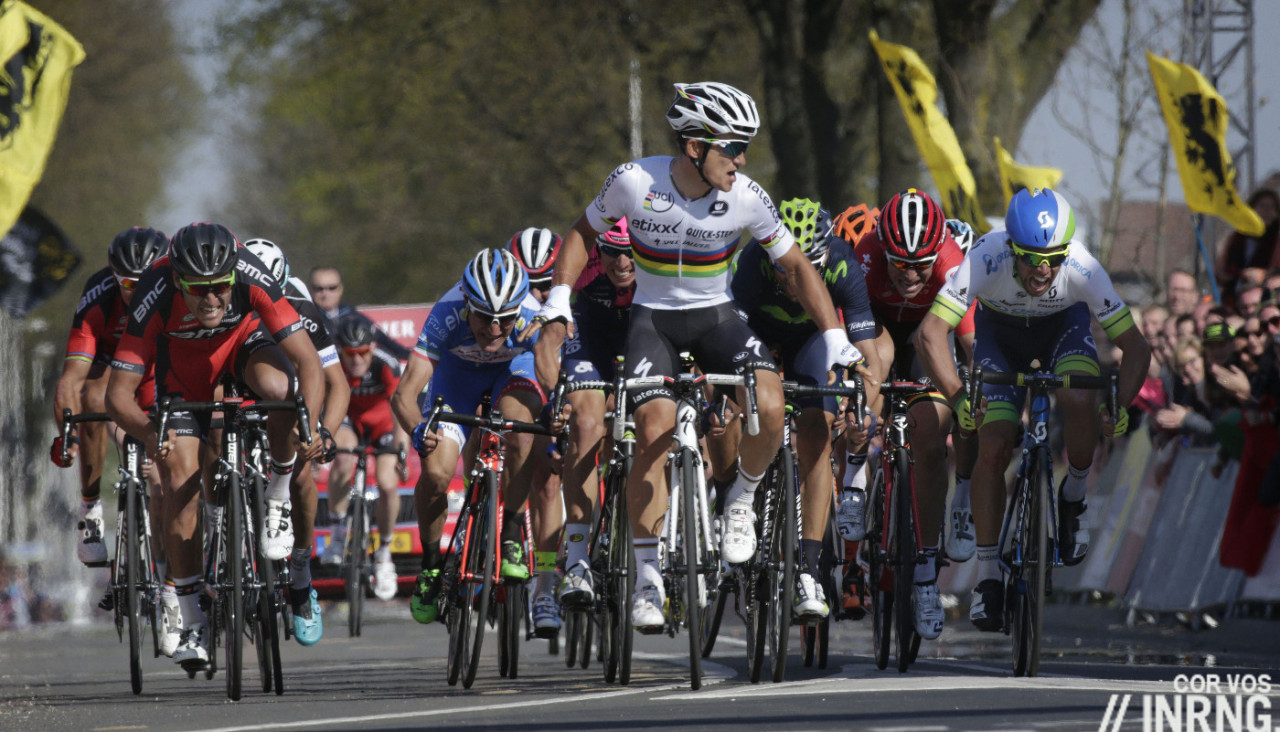
Nice to see the Rainbow Bands (with black shorts) victory salute crossing the finish line.
Classic image.
+1 AND a proper cycling cap as well! Dunno which of the other hats are sillier, Valverde’s, Matthews’ or those of the Amstel ladies?
AND he drank the whole pint!
Kwiatkowski is definitely one of the most stylish peloton, and seems like a good lad too
We heart Kwia.
Inring I have to gloat as I have called Paterski in top ten. With a slightly more measured effort on the Cauberg he could have placed higher. Kwiatkowski has the nerves of steel. He looked like he popped on the climb but allowed Katusha rider to drag him up. I thought he didn’t have the minerals for the sprint but he simply waited for the perfect moment recovering as much as possible in the circumstance. Unreal! I know this is a remake of the past but I love thus race and I’m going out to buy an Amstel 🙂 I think had Tony Martin committed to the escape it had a chance. He didn’t for the obvious reason. I love Tony such an awesome rider and so committed to his team
Good call. I saw the comment yesterday and didn’t have time to reply but he’s been the team leader, fortunately ahead of Rebellin and is useful on these punchy courses.
great observation! We have a saying in Poland: “itchy leg” that means he should (Paterski) wait for last 400-500 meters. One more Amstel for me, please
Everybody who did not want Gilbert to win again – and that includes Kwiatkowski – should thank Matthews who prevented exactly that by (just) managing to stay on his wheel. Kwiatkowski was remarkably fast(er than anyone else) in the sprint which not only means that he’s once in again in great shape but also that he had a strategy which he followed very closely even when the race was full on on the Cauberg and intentionally saved something for the sprint. But without Matthews’ heroic fight on the Cauberg it would most probably have been Gilbert again.
This race obviously needs another course for the finale.
+1
Agree with that. Imagine being Philippe Gilbert, to put in that big attack only to look around and find none other than Matthews sitting on the wheel, the last rider you want to take to the finish line.
Totally right, Gilbert is still a game changer on these steep climbs, but i think he’s lost something from his sprint, as a few years ago ( 2011) he was regularly finishing a credible 3rd to the cav in TDF sprints. If however he’d have broken Matthews, he’d have very probably TT’d to the finish solo. Still a class act though.
Kwiatowski deserves great credit. He’s getting stronger and stronger, and I agree, he’s prime pick for LBL.
I have absolutely nothing against Gilbert and much respect for his palmares, but still I’m glad that he didn’t win again. BMC controlled the race and invested so much work but still they had no other plan than the one which had worked out for Gilbert before. That is on the one hand somehow understandable but on the other hand much too narrow-minded for my taste. Imagine it would have worked out again. A totally preprogrammed classic win? Not only the winner but also the way he wins? Not sure what BMC, Sky and others are thinking, but unlike many team sports like football, ice hockey, etc. most cycling fans are typically and fortunately not bound to a certain team which they want to see win no matter how in order to be satisfied. They want to watch exciting races with (mostly) deserving and sometimes maybe also lucky winners. And the way BMC was trying to force the race into becoming a matter of three minutes of excitement – well not exactly but rather admiration for the unique ability of PG – doesn’t do a classic justice.
I observe and dislike that many races are run more and more formulaic in recent years and most race organizers have not yet reacted to and counteracted that development by redesigning race courses. Something should be done about this. But maybe it’s just me or a small minority who thinks that.
And yet the only teams that were putting riders up the road trying to win the race before the Cauberg were Astana with Nibali and Fulsang and IAM with Tanner. There were plenty of teams riding to the finish alongside BMC.
Right! Many teams seem to accept that this is the way that these races have to be run nowadays. And if we consider that the average speeds haven’t decreased a lot since the dirty years but most of us agree that the peloton is considerably cleaner now and the differences in the level of performances have become much smaller it has evidently become much harder to go on the attack and ride away from a big peloton when you have one, two or even three teams interestend in keeping it together.
Please don’t get me wrong: I don’t wish cycling back to those years of performances that could make you wonder “How on earth did he do this?” when Bjarne Rijs won Amstel with a long range solo attack or when Tyler Hamilton won that TdF stage to Bayonne with an incredible solo over 90 k’s.
But if you have a course with >250 k’s and >4.000 m of climbing spread over 34 climbs and still nearly everyone in the field agrees that there’s no sense in attacking because the race will inevitably be decided in a mass-sprint up the Cauberg then that is a threatening development, isn’t it?
That’s why I welcomed the “vintage Vincenzo” we saw yesterday. Two or more men of his caliber sharing the load would have made it very, very hard for BMC to pull them back even on this kind of Autobahn-course on the final loop.
Hamilton was also sporting a broken collarbone.
I can definitely see that point – the strongest man up the climb didn’t win.
But the flipside is that it makes it a bit different from FW and LBL.
And, sometimes, the rider with the best tactics wins: today, Kwiatkowski, who let everyone else do the work until about 100m to go.
Particularly pleased as Kwia was blocked in last year’s LBL by Martin’s fall.
But I agree with the idea to change the final circuit.
Agreed. The best moment of the race was matthews’ fight to stay on gilbert’s wheel, and that was the decisive moment. If Matthews does not fight, I think Gilbert would have won again.
But god, what a boring race. I really don’t understand why etixx do not let Martin help Nibali in the break. As well, an escaped GVA with Fulgsang before the Cauberg would have been tactically very interesting for BMC.
Kwia is a worthy winner, but this victory cannot be compared with Kristoff and Degenkolb ones. We cannot say that he put himself in a good position for winning, he was just brought back by other riders after being dropped. He then perfectly took his opportunity in the sprint.
Great review as ever, thanks! Chapeau to Meehow (look Carlton, Inrng told me how to pronounce it!) who is clearly a class rider; a bit baffled at Lefevre’s apparent criticism of him. I did wonder if Bling hanging on to Gilbert was decisive as perhaps Phillipe then eased off? Maybe not as clearly everyone was on the limit…. Anyway, a better race than I expected (thanks to Vincenzo) and a worthy winner.
Oh, and my personal highlight?
Carlton Kirkby: ‘I have no idea where that comment came from’
Daniel Lloyd: ‘Same place all your other comments come from…’
People still get his name wrong, Kia-tao-ski is common. Here’s the correct pronunciation:
https://soundcloud.com/pawe-gadzala/micha-kwiatkowski-1
It’s even worse in other places. France 2 & 3 commentator Thierry Adam pronounces it Mee-shal ka-tov-ski and as such, half of France is saying it like that!
yes, the french pronounce everything in french even in most obvious cases.
Ha! The sound was turned right down at my mate’s when we watched it, so on the plus side I missed Kirby’s inanities…but on the minus side I missed that Lloydy gem!
Go you good thing
Well said for the -needed- course. I was refreshing ProCyclingStat’s page after the race, to see how many were in the two first main groups, so I could compare it with Milano-Sanremo’s finish. It’s 46 to 47. Not so good for a hilly classic.
Really enjoyed the race; for some reason Amstel Gold is the one race I manage to catch every year that isn’t on my ‘must see’ list. I’ve like Kwai for a long while and it’s great to see him celebrating in the rainbow stripes. Nice also to have a ‘new generation’ name on winner list too. It’s a fair rogues’ gallery over the last couple of decades.
A shame for Matthews. I can’t really see what else he could’ve done after Gilbert made his move. Still, he’s just 24 and two classics podiums isn’t bad going. Let’s hope he rips another GT as well like the first week of last year’s Giro.
Bling made the right move, it just didn’t work out. You can’t NOT go with Gilbert on that climb, if you’re able, but it clearly took the sprint out of his legs. I reckon he’d do the same again, and again. He looked a bit non-plussed on the podium, but shouldn’t be too hard on himself.
Odd that Gilbert went to the back before the sprint. He’s unlikely to be anywhere near winning a sprint with those riders and, obviously, he’s going to be knackered after the climb – but so was everyone else, especially Matthews. He should have tried to lead out Van Avermaet – who had to do too much work on his own (with some help from Hermans). Considering the work his team did for him, Gilbert could have put in one effort for his team mate.
As GVA said “I felt good, coming from the back, but I was in the wind too early. I had to go with 300 metres to go. With one extra man it would have been playable.”
The two of them are more colleagues in the same company than teammates.
Yes, but GVA had worked for PG in that race – he could have returned the favour.
Seems like team management should sort that out: you don’t have to be friends; you do have to work together (much like all the Froome/Wiggins nonsense).
As good as Alaphilippe’s performance was, unfortunately he isn’t a neo-pro as you suggested. Good result nevertheless.
Remember a neo-pro is a rider U25 in their first two years of a pro contract.
Cool. Thought it was just first year pros.
Oxygen debt?? Come on! Are we talking about Seb Coe running 800 metres?? I think a big classic should be decided by the capacity to overcome unbearable pain in the legs… When it’s about oxygen, it’s clear the race/course is very, very far from being demanding enough.
I also wish Martin and Van Avermaet had been allowed to take turns in their respective breaks… They really could have won (and they could never win otherwise). I wish next year both of them are given the freedom to race their own race. I especially would like to see Tony Martin away from Lefevère. He’s starting to look too much like Boxer the cart-horse from Animal Farm.
A very poor race, despite Nibali’s valiant effort.
And a good article, as always.
You realize of course (I deeply, deeply hope) that the leg pain at the top of a climb is due to lack of oxygen.
I do, but I think you know I mean the difference between the oxyegen debt of a mile runner as opposed to the pains of a marathon runner.
Ha, thats a great description re Martin resembling Boxer. He is clearly the strongest rider not only at Quick Step but also probably in the whole peleton, and you’d think if he was able to hold off an entire peleton (just about) on a 150km Grand Tour stage when every team is at full strength and pulling at their best you’d think he could hold off a depleted peleton in a classic when there are 5 men tops per team left. Unless he’s only good out to 150km, like Kittel or Greipel, and then tails off. I think a few riders would be well off out of Quick Step who have too many good riders and most of the time seem unable to decide what to do with them!
Wouldn’t it have been ironic if GVA had won, only to then have the victory taken off him for doping?
The investigation relates to 2011 so if was to be convicted, the ban could be backdated to this period. But a big if, the case doesn’t sound like a “slam dunk” for the prosecutors.
chasse patate: the moment the pun was won. Have a vodka on me
I enjoyed the race, especially due to Nibali’s input. BMC need a different plan for next year.
I agree that using the Worlds circuit doesn’t really add anything as the 2 hills it features are not too challenging and obviously 258km and 34 climbs is not selective enough these days! If the organisers wanted to really make big changes they could look south and cross the border into Belgium. There are some much longer climbs around the Aubel/Verviers region, including a couple over 20km around Eupen. Some of these will be used in the Ster ZLM Toer coming up in the next few weeks. However, this may change the nature of the race significantly and I suspect the organisers like it the way it is. The finish on the Cauberg is unlikely to change for a while, partly because the start-finish arrangement is in place until 2017 and partly because the climb is the most famous in the Netherlands.
Steve
Well played for Astana, they did the best on what they have. Imagine if Westra were in the mix it would have made a difference. De Vreese went early to set up Nibali and Rose. Then Fuglsang seems to be their last option.
As for Orica, not really sure if Weening could be a factor here, they should have anticipated that MM needs a good leadout and should have sent a teammate in the final stretch. What is Albasini doing? Clarke did a great job for them then Impey and Weening were there to set up MM for the final climb. It was Albasini’s role to stay with the favorites to support MM.
BMC did a great job of controlling the race. They still have four men in the final climb despite exterting too much effort keeping the break in check.But they simply do not know what to do in the final stretch, why would you put all your hopes on Phil Gilbert when you have GVA. Hermans is turning out to be a force.
Movistar looks alarming, for three straight year it seems that they are doing all the work early and no one is ther to set-up Valverde. They was boxed out by Orica going into Cauberg. Valverde needs a good domestique that will be there from him. No way they can control Astana, Katusha and Sky at LBL.
What’s going on with Katusha, maybe they are still saving their energy for FW and LBL?
Sky and Lotto perhaps did not even bother to plan out a strategy.
Felline, Domoulin, Valgen still have work to do if they want to be a high player and earn a good contact.
Disappointments were Arredondo and Barguil
Not hilly enough for Arredondo? FW and LBL will suit him more, so may have been saving some. They’ll possibly suit Bauke Mollema a bit more as well, although he’d have obvious reasons for have wanted to be better placed up the Cauberg than he ultimately was.
Perhaps Gilbert is losing a bit of top-end power as he gets older, younger stars like Bling Matthews and Kwiat are reaching their full potential, or a bit of both, but the Cauberg no longer feels like Gilbert’s home turf.
Agree. Pip used to be able to gap his rivals with the searing jump + just a handful of pedal turns, and maintain that gap. I think its a mix of factors as you suggest.
Too bad GVA apparently was on team duty for PG when he went with Fuglsang. Fuglsang’s sprinting (dis-)ability would have made this a walk-over for GVA if he had pulled through in that attack. A chance of ending his streak of secondary placings.
Difficult to see the move sticking. Even in retrospect I think BMC played the right card with Gilbert, he aaaaalmost shook Matthews off and got away alone
I see it the same way. Etixx rode a similar race and it worked out for them. And in nearly worked out for Gilbert a forth time.
well, I thoroughly enjoyed that win by Kwiat. Che classe.
Why didn’t van Avermaet work with Fuglsang?
Gilbert had plenty of help left in the peloton, and even if GVA had crashed and broken his leg, he would still have beaten Fuglsang in the sprint.
Seems BMC were all in for Gilbert. Besides if GVA had worked, the worry is surely that Fuglsang is a grand tour level climber and could have gone clear over the Cauberg?
But did a “grand tour level climber” ever win over a punchy rider on the Cauberg?
And GvA working with Fuglsang would have taken away the need for them to chase before the final climb up the Cauberg thus saving some more energy for the lead-out. I think it was a win-win opportunity which BMC did not take.
I know, I know it’s all hindsight knowledge, but that’s why I think that BMC lost the race deservedly. Whenever a team is so convinced that it’s their captain’s race to lose and race accordingly for everyone else to see then it’s only just that they do not win.
Worth remembering Gilbert’s primacy in the team, he did not seem delighted with Hermans’ win the other day and he was part of the push to get John Lelangue out of the team, he’s influential.
And yet the story is that BMC booted Gilbert’s personal swanny last year….?
Regarding the race route, I am totally in line with the wise opinion of INRNG.
The last loop, with only the bemmelerberg and the wide and windy roads, does not leave much room for anticipation. They should try something else (for instance eyserbos -> fromberg -> keutenberg just before going to Valkenburg).
I don’t know about anyone else, but seeing as Quintana is Movistar’s designated Tour de France team leader I would be interested to see how Valverde would go in a crack at the Green Jersey. I’d imagine in flat sprints he wouldn’t be a great deal different to JJ Rojas, and in any kind of mountain or medium mountain stage he would rack up a lot of points. I think if the competition was as it once was, and equal points were given to every stage and not weighed towards flat stages, he’d be a shoe in most years. Obviously it won’t happen and he’ll be chugging away on the front in the hills for Quintana in a role not dissimilar to Porte or Kennaugh at Sky. The Green Jersey competition suffers a lot from the one dimensional aims of most teams who are happy to throw their eggs behind one specialist. Sagan has dominated the Green Jersey in recent years, but in the last 2 years he has been the only person trying, and may well be this year. Degenkolb will probably be working for Kittel, Kwiatkowski if he even goes will be working for Cavendish, likewise Stybar, Valverde and Rojas for Quintana, Gilbert probably isn’t going, van Avarmaet if he hasn’t been banned will be working for van Garderen, Swift will be pulling for Froome if picked, if Cancellara has recovered he’ll be wasting his energy on somebody who has no chance such as Mollema or Schleck, and it goes on like that for most teams. That leaves Kristoff able to focus on it, and maybe Matthews and Bouhanni. Of which only Matthews can hope to challenge Sagan on a lumpy stage. It’s a shame I think, only one person can win the GC, and if you haven’t got one of the ‘Big 4’ you’re wasting your time anyway.
Apologies for this having nothing to do with Amstel Gold. I was very impressed with Kwiatkowski, he seems to be pretty close to what Gilbert was circa 2009-2011. I.e, on his day able to contend for any classic bar Paris-Roubaix. It would be interesting to see him in a team where he could be guaranteed team leader in every classic, including Sanremo and Flanders. I don’t imagine Quick Step are going to let him go in a hurry but with Gilbert a bit past his prime and van Avarmaet potentially banned maybe he would fit in well at BMC?!
Unfortunately, stage wins are more prized than the lesser jerseys. One way to combat this would be to up the prize money for the mountains and points jerseys – the money could come off the yellow jersey prize money. Thus, those jerseys would get more cache, there’d then be more competition and the Tour would be a more interesting race.
In the past, riders used to really try to win these jerseys and a team like Trek, to take one example, could focus on Mollema winning the mountains jersey, rather than – as you say – a hopeless punt at the GC.
Surely, one would rather win the polka dots than come 7th overall?
Riders who won many mountains classifications in the past are still remembered: riders who racked up a load of top tens are not.
Does prize money really come into the reckoning, though? The teams and the sponsors are interested in the publicity they get from stage wins. Only the mechanics and soigneurs really gain from additional prize money.
Honestly, I don’t know. There might well be better ways to improve the standing of the points and mountains jerseys: I just don’t know what these are. For me it’s disappointing that they’re no longer held in the same regard as they once were. Trebling their prize money might be a start.
Nope. It aint about the prize money at the Tour. Its about the publicity for the sponsors, and for the riders, well, the money comes with hikes in sponsorship, securing future contracts/more lucrative contracts, and the post-Tour crits.
I didn’t understand why BMC was trying the same old Cauberg – Gilbert move to win this race. If every spectator and commentator knows what Gilbert will do, then sure every rider in the race will know it. So certainly no surprise factor which broadens the chances that someone would and could counter his moce. And Gilbert should also have known how the wind would be after the Cauberg, then he would know that eventually a solo from the top of the Cauberg would be very hard to do (something Gilbert himselve stated afterwards). If only Gilbert had tried GVA to the sprint and shown the same level of loyalty to the team as GVA did that day… God damn, I want to see GVA win a big race.
Sidenote: GVA would most likely not be banned. The evidence is futile and the demand for a band is more aimed at warning riders.
Agree, but as for the sidenote, have you seen the evidence?
I haven’t – are the e mails even publicly available? – but it seems unlikely that the Belgian cycling authorities would want to ban a Belgian unless the evidence was pretty damning (generally, countries have always been particularly lenient with their own riders).
But then I very rarely believe a cyclist’s protestations of innocence, having heard so many – and so ridiculous – excuses.
tony martin rode an amazing race. i didn’t see him or kwia any further back then 15th wheel in the last 70km. amazing stuff, amazing race.
Shows how little I know about cycling, but I genuinely don’t understand why Martin isn’t deployed to win one-day races. Is he just at the wrong team?
I’ve often wondered why – in particular – he isn’t used in the cobbled classics: seems made for Paris-Roubaix and you’d think could even handle the climbs of the Ronde.
Is he just rubbish on cobbles? (Doesn’t seem likely – he’s an excellent bike-handler going downhill.)
I heard him say once that he has no love for the cobbles.
I can answer on the point of the cobbled classics – he has said in interviews that he has absolutely no desire whatsoever to ride them. It frustrates Rolf Aldag no end, but Big Tony is adament. Just like he’s said he has no burning desire to try to become a GT contender and shed all the necessary kgs.
No desire to ride cobbles…a bit surprising coming from a man who rubs his scrotum to a bloody mess in time trials on a saddle prepped with sanding paper.
ah, but that was ‘just’ for an hour (or whatever the duration was of that particular TT) 🙂
Maybe he doesn’t fancy the crashes and the constant fighting for position…who knows…
Sometimes, after chugging up Artist’s Lane to the Wizard at Alderley Edge without – incredibly – having to get off and push at any point, I daydream, “could I have been a contender, if I’d started younger/practised more/had a higher haematocrit (whatever that is)?”
Then I remember the whole ‘blood and pus seeping through his jersey’ Tony Martin thing and realise: “no”.
Mike Terpstra perhaps has the facial expression of his brother, but their bodies are quite different… I shared a group ride with Mike on Mallorca – the guy is as thin as a blade of grass, a pure climber. I doubt he would survive for a mile on cobbles ;-).